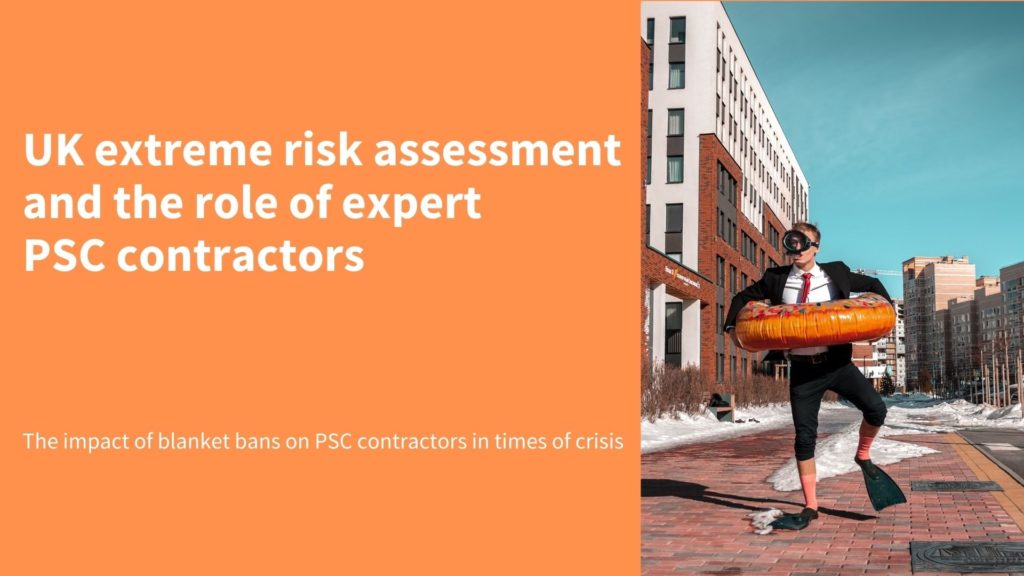blanket bans on PSC contractors exposes UK to risks
SPECIAL REPORT
UK vulnerable to extreme risks due to government’s “default to secrecy” and lack of experts

COVID-19 has exposed the UK’s risk management system so much that it is deemed as “deficient and too inflexible” to provide the protection the nation needs for the most serious risks, according to the House of Lords Risk Assessment and Risk Planning Committee.
In its report, Preparing for Extreme Risks: Building a Resilient Society, the committee has said that the UK must be better at anticipating, preparing for and responding to a range of challenging risk scenarios, including those which it has never experienced before.
The Committee is urging the government to better engage industry and businesses when developing risk assessments to ensure that it is aware of private-sector capabilities and that business and industry know their role in responding to crises.
The report findings come at a time when the government needs to get a better sense of capacity when it comes to hiring interim workers, such as contractors and freelancers, in times of crisis.
Where is the UK going wrong with its risk assessment?
The House of Lords report emphasises that the Government’s current strategy of “centralised and opaque risk assessment and risk management,” and as a result has left the UK vulnerable because it fails to make adequate preparations.
“The Government had been advised that in the event of a Coronavirus pandemic, the country would suffer up to 100 deaths,” said Lord Arbuthnot, Chair of the House of Lords Risk Assessment and Risk Planning Committee.
He continued, “Given that more than 140,000 people have now died in the UK, it is clear that we needed to re-examine our system of assessing and planning for extreme risks.”
Lord Arbuthnot said that the Government’s risk management system defaults to a “secretive and centralised approach that withholds safety-critical information from those who need it – shielding it from full scrutiny and challenge.”
He believes that the Government must open up the risk management system and welcome expert consultation from a wider variety of sources.
In a national crisis, expert interim and freelance experts will be in high demand in areas including healthcare (locums and medical research) education, environmental, energy, construction, security, defence, law and cybersecurity, to name a few.
However, will the government find it harder than ever to get these specialists on board if it means changing their status from an independent limited company director to an umbrella company employee to remain “outside IR35”?
Will blanket bans on specialist contractors be lifted too late?
“Specialist professional freelancers who are genuinely self-employed are hired to provide their services on a project-by-project basis, so it shouldn’t be any more difficult for government agencies and departments to hire them in a crisis,” according to Dave Chaplin, CEO of ContractorCalculator and compliance solution IR35 Shield.
However, he adds: “The problem arises when hirers opt to blanket ban limited company contractors as we have seen happen since the Off-payroll legislation came into effect.
“Blanket bans mean that hirers have fewer options when it comes to hiring the best talent as that talent has now sought work elsewhere, although we know that some Government departments have started to lift blanket bans as we saw earlier this year at Network Rail.”
HMRC’s Revenue and Customs Digital Technology Services (RCDTS), for example, has denied that it has hiring policies that unfairly favour limited company or personal service company contractors within the department or its technology arm, according to a Computer Weekly report.
HMRC’s accounts between the 12 months to 31 March 2021, showed that it engaged 403 temporary workers, which was even higher than the previous year, of whom 15 were determined to be working inside IR35. The remaining 388 individuals were classified as “out of scope” of IR35.
HMRC confirmed to Computer Weekly that the vast majority of the individuals classified as being out of scope of the off-payroll rules were employed via umbrella companies during this period.
Cyberattacks: government at back of the IT talent queue

Experts in cybersecurity are in huge demand, says Chaplin a former IT contractor in the financial services industry.
“They can work for companies anywhere in the world so the government might find itself at the back of the talent queue when they need these experts. Self-employed professionals don’t want to work on payroll as employees without any of the rights that come with permanent employment,” he says.
In a recent IR35 Shield survey it was found that whilst 88% of contractors are told that they must work through umbrellas, only 6% are happy to do so.
How can the government justify unregulated umbrella companies in a crisis?
The Government this week has called for evidence to help it better understand how the umbrella industry operates. Despite the industry being unregulated, Chaplin believes many umbrella companies are “compliant and operate to rigorous standards, providing a valuable service to contractors and the firms that use them.”
“However, it is vital that everyone throughout the supply change conducts their due diligence and carries out robust checks to ensure that no tax avoidance or disguised remuneration schemes have entered the supply chain as we saw during the pandemic when thousands of nurses and social workers were hired and forced to use certain companies posing as umbrella firms and are now facing enormous tax bills,” says Chaplin.
Since the rollout of the Off-payroll legislation, IR35 Shield witnessed a significant rise in the proliferation of disguised remuneration schemes that have duped contractors into signing up for them. The survey revealed that 78% of contractors can’t detect a tax avoidance scheme from a compliant one.
“That is a ludicrous position, when hundreds of millions, if not billions of pounds are being channelled through an unregulated sector. Many of us made representations to Jesse Norman when he was Financial Secretary to the Treasury, urging him to regulate the umbrella sector before the rollout of the Off-payroll rules but he did not listen.
“With another call for evidence by the government, let’s hope they will listen now. I will be working with policymakers over the coming year to help them find and implement a fair solution,” says Chaplin.


